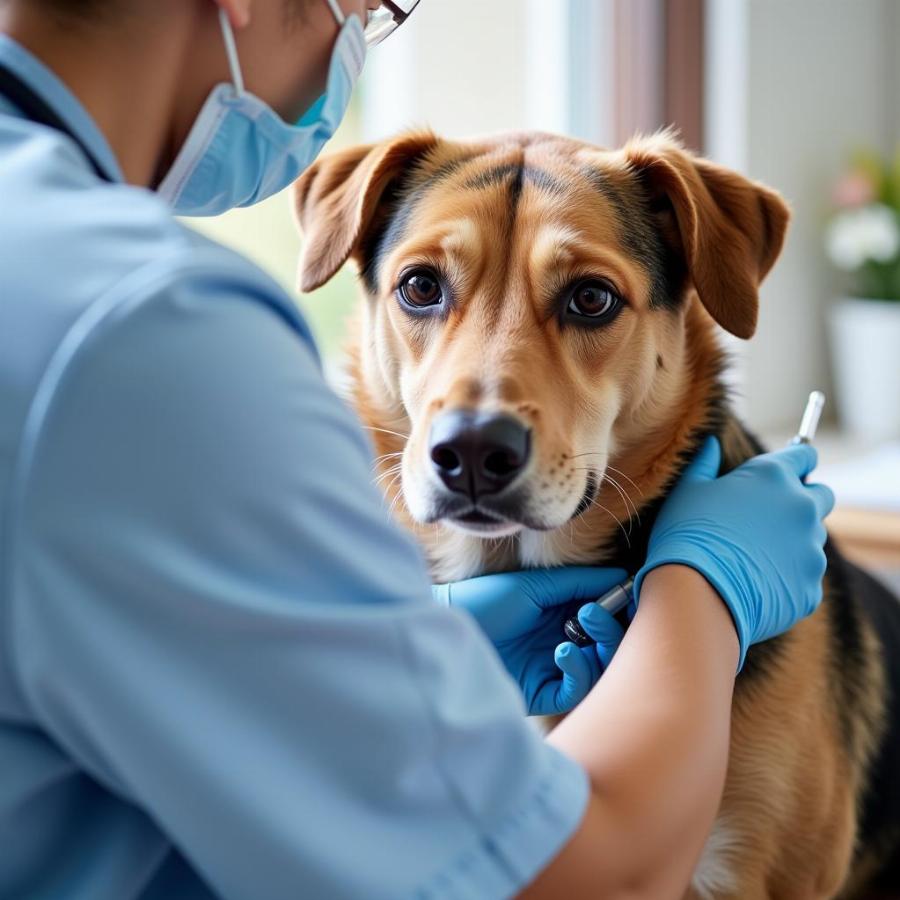Hepatitis in dogs is a serious liver inflammation that can be caused by a variety of factors, including infections, toxins, and certain medications. Understanding this condition is crucial for any dog owner. If you’re worried your dog might have hepatitis, this article will provide valuable insights into the causes, symptoms, diagnosis, and treatment of canine hepatitis. We’ll explore everything you need to know to keep your furry friend healthy.
What is Canine Hepatitis?
Canine hepatitis isn’t just one single disease; it’s an umbrella term referring to inflammation of the liver. This inflammation can range from mild to severe, impacting your dog’s overall health. Several factors can contribute to canine hepatitis, including viral infections, bacterial infections, exposure to certain toxins, and even reactions to medications. Identifying the specific cause is vital for effective treatment. The most common form of infectious canine hepatitis is caused by Canine Adenovirus Type 1 (CAV-1), a highly contagious virus that can spread rapidly among unvaccinated dogs.
What Causes Hepatitis in Dogs?
As mentioned earlier, several factors can lead to hepatitis in dogs. The most common culprit is the Canine Adenovirus Type 1, often spread through contact with infected bodily fluids like urine, feces, or saliva. Other causes include Leptospirosis, a bacterial infection, certain medications like acetaminophen, and toxins such as xylitol, a sugar substitute. Less common causes can include autoimmune diseases, where the dog’s immune system attacks the liver, and certain genetic predispositions. Understanding the potential causes can help you take preventative measures.
Symptoms of Hepatitis in Dogs
The symptoms of hepatitis in dogs can vary greatly, depending on the severity and underlying cause of the condition. Some dogs may show no signs at all, especially in the early stages, while others may experience a range of symptoms from mild to life-threatening. These symptoms can include lethargy, loss of appetite, vomiting, diarrhea, jaundice (yellowing of the gums, skin, and whites of the eyes), abdominal pain, fever, and increased thirst and urination. In severe cases, dogs may experience seizures, coma, or even death.
How is Canine Hepatitis Diagnosed?
If you suspect your dog has hepatitis, it’s crucial to seek veterinary attention immediately. Your veterinarian will perform a thorough physical examination and conduct several diagnostic tests. These tests can include blood work to assess liver function, urine analysis, imaging studies like X-rays and ultrasounds, and in some cases, a liver biopsy. Early diagnosis is critical for successful treatment and management.
Treating Canine Hepatitis in Dogs
Treatment for canine hepatitis depends on the underlying cause and the severity of the condition. For viral infections like CAV-1, supportive care is often the primary approach, focusing on managing symptoms and preventing secondary infections. This might include intravenous fluids to maintain hydration, medications to control vomiting and diarrhea, and nutritional support. In cases of bacterial infections, antibiotics are typically prescribed. If the hepatitis is caused by a toxin or medication, removing the offending substance is essential. Early signs of bladder cancer in dogs can sometimes mimic the symptoms of hepatitis, so accurate diagnosis is essential.
Can You Prevent Canine Hepatitis?
The good news is that the most common form of infectious canine hepatitis, caused by CAV-1, is highly preventable through vaccination. The DA2PP vaccine, which protects against distemper, adenovirus type 2 (which causes respiratory illness), parvovirus, and parainfluenza, also protects against CAV-1. DA2PP vaccine dogs are much less likely to develop this serious illness. Ensuring your dog is up-to-date on their vaccinations is the most effective preventative measure. Other preventive measures include avoiding contact with infected dogs, practicing good hygiene, and keeping your dog away from potential toxins.
 Preventing Canine Hepatitis Through Vaccination
Preventing Canine Hepatitis Through Vaccination
FAQs about Canine Hepatitis
Can humans get hepatitis from dogs? No, the Canine Adenovirus Type 1 (CAV-1) is species-specific and cannot be transmitted to humans. However, other causes of hepatitis, like Leptospirosis, can be zoonotic, meaning they can be transmitted from animals to humans.
How long does it take for a dog to recover from hepatitis? The recovery time for canine hepatitis varies depending on the cause, severity, and the dog’s overall health. It can range from a few weeks to several months.
Is canine hepatitis always fatal? No, canine hepatitis is not always fatal. With prompt diagnosis and appropriate treatment, many dogs can recover fully. However, severe cases can be life-threatening, especially if left untreated.
What is the best diet for a dog with hepatitis? A best diet for dogs with liver disease often involves a low-protein, low-fat, and easily digestible diet. Your veterinarian can recommend the most appropriate diet for your dog’s specific needs.
Can puppies get hepatitis? Yes, puppies are particularly susceptible to CAV-1 infection, especially if they are not vaccinated.
Are certain breeds more prone to hepatitis? While any dog can develop hepatitis, some breeds, like Doberman Pinschers, may be slightly more predisposed to certain forms of the disease.
What are the long-term effects of canine hepatitis? Some dogs who recover from severe hepatitis may experience long-term liver damage, which may require ongoing management.
More Questions About Your Dog’s Health?
We understand that having a sick dog can be a worrying time. For further guidance on canine health issues, you can check out our articles on lymphocytes in dogs and cute cocker spaniel dogs.
Conclusion
Canine hepatitis is a serious condition that requires immediate veterinary attention. Understanding the causes, symptoms, and treatment options is crucial for responsible dog ownership. Vaccination remains the most effective preventative measure against the most common form of infectious canine hepatitis. By staying informed and proactive, you can help protect your furry friend from this potentially debilitating disease.
Beaut Dogs is your trusted resource for comprehensive information about dog breeds and their care. We are passionate about providing valuable insights to help you navigate the joys and challenges of dog ownership. When in doubt, always consult with your veterinarian. For further assistance, contact us at Email: [email protected] for detailed and accurate answers. Beaut Dogs is here to help.